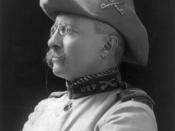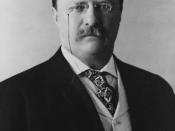Edmund Morris's first book, ''The Rise of Theodore Roosevelt,'' won the author critical acclaim and a Pulitzer Prize, and brought him to the attention of the friends of Ronald Reagan, who enlisted Morris to write an authorized biography of the 40th president. The result was the almost universally panned ''Dutch,'' a book that outraged the Reaganites and irked the critics by injecting a fictionalized Morris into the middle of Reagan's story.
What caused this plunge from grace? The author pleaded literary license for his departure from the norms of nonfiction, but one has to wonder whether something else was involved. Every biography is a life and times, and every biographer is both a portrayer of life and a historian. The best biographies match the talents of their authors to the salient aspects of their subjects and stories. Morris's ''Rise of Theodore Roosevelt'' was just such a match, for Morris is above all a portraitist - perhaps the best currently writing - and the young Roosevelt was a subject for portraiture like few others in the annals of American life: brimming with energy, bursting with himself, leaping off the canvas of every page.
Ronald Reagan was a different matter entirely. The Gipper told amusing anecdotes, and in his maturity had one big idea: that communism was the root of all evil. But as an individual, as a subject for a literary portrait, he faded into obscurity next to Roosevelt. Reagan was, in some respects, as important as Roosevelt, but his importance lay in his connection to his times. And that connection falls in the realm of history rather than portraiture, where Morris is less adroit - and, by all evidence, less interested. Having received a multimillion-dollar advance for his Reagan book, he must have felt a need to...


